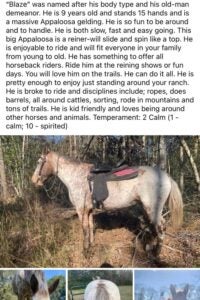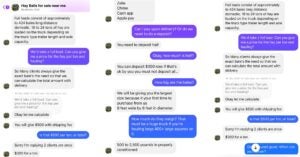Imagine that you come across a Facebook advertisement for hay that appears to be good quality, you contact the buyer, and you’re answered with a typo-laden request for a deposit to hold the hay for your farm.
Does this feel at all legit?
Agricultural scammers are getting increasingly good at taking pictures and descriptions of valid advertisements, marketing agricultural products as their own through fake or stolen profiles, collecting deposits, and then “baling” with your hard-earned money. They like to target areas of particular need, like drought-hit states such as Missouri, Kansas, or New Mexico.
It doesn’t just happen with hay, though. Other agricultural products and livestock are being sold using the same tactics, but it’s worth noting that these fake sellers typically won’t communicate by phone or offer a contact number, and their ads sometimes feel “off” with typos or details that don’t quite add up.
For example, this horse’s photos don’t quite match the description. When contacted, the buyer requested a deposit and began phishing for personal information.

But we at AGDAILY wanted to really get in deep on the issue. So in another instance, we put on our best naïve mask and reached out to a Facebook page to inquire about an obvious scam. If the title “Hay Balls for sale near me” wasn’t a clue, the fact that they said they could deliver anywhere and stole a description straight from HayUSA.com of how many bales they could send us stood out significantly.
“Full loads consist of approximately to 424 bales long distance domestic. 18 to 24 tons of hay are loaded on the truck depending on the truck depending on the truck type trailer length and axle capacity,” the scammer wrote, awkwardly.
We asked what kind of deal they could get us.
“You will give $500 with the shipping fee,” was the answer. But wait? Per ton, or $500 total for 424 bales of unclear size? We’re still a little bit unsure as to what it’s going to cost to get this hay delivered, so we pressed further.
We don’t know how much hay we’re getting yet, or really what the price is, but this scammer was quick to start asking for personal information. We gave them a fake name and a New Mexico delivery address that was actually a law enforcement office.

The request for a deposit didn’t take long. The amount was unclear … but so was the size of the hay bales.
“You can deposit $300 now if that’s ok by you you must not deposit all…,” they wrote. But they also said they needed 50 percent down to deliver.
So we asked for clarification on the size of hay they’d be delivering. “We will be giving you the largest size because it your first time to purchase from us. 8 feet wide by 6 feet in diameter,” they responded.
Even better, they assured us that the bales weigh between 500 and 2,500 pounds. Those will be hard to stack … but they’ll be even harder to ship.
Perhaps they plan to deliver by cargo ship? Except not even a cargo ship is going to carry that load; this scammer is going to need a few boats. And in case you didn’t know, there’s no oceanfront property anywhere near the law enforcement office we gave them in New Mexico.
The amount of the deposit was still unclear at this point. But, we did the math based on a rate of $500 per ton (rather than per bale), and if they’re sending us 424 bales that weigh 2,500 pounds and we need half down, we should be sending them $132,500. But OK, a mere $300 will do.
We asked when the hay could be here and that’s where it really starts to get good. The hay, coming from Oklahoma City, could be here in six hours.
Oklahoma City is over nine hours from the delivery address we provided at the local law enforcement office. Even if it did take six hours to get here, it must already be loaded on the truck. They even promised that they can get us a tracking number — handy!

Meanwhile, the scammer kept asking for payment and personal information and ultimately did give us a phone number with a Manhattan, New York, area code (not Oklahoma City). However, a quick search revealed that the number has already been reported for scam calls.
So, we decided to see if they’d let us send a friend to take a look at the hay. They gave us an address in Oklahoma City that turned out to be an empty lot — which coincidentally had been sold the day before our conversation.
No worries, though, “You don’t have to be skeptical about anything,” the scammer wrote. Pardon us for not feeling reassured.
We asked why their number was from Manhattan if they’re in Oklahoma City. “I’m a business person so mu number is New York not Montana,” they responded complete with typos. Checkmate. We thought they were in Oklahoma?
“But we are serious business people if you’re not comfortable we can proceed with other clients,” they wrote.
So, we asked for an address that wasn’t an empty lot. “I’m not sending any address your stress me up here I’m working on another delivery,” they responded, clearly frustrated.
Well, “hay balls” person, your lack of punctuation stresses us out.
Despite their frustration, the scammers weren’t willing to quit quite yet. They asked one more time for payment and said, “… my address go nothing to do with the hay you wanna purchase.”
But, how can our “friend” come look at the hay if we don’t have the address?
“We don’t need you friend before we delivery to you,” was the response. “We’ve got serval issues because they come to take pictures of our hay an put on fake sides online.”
Cool. Because we’re super sure the photos on your site aren’t fake (cue the eye roll).
“That’s why I’m sorry but if you can’t pay without your friend seeing it we will pass thanks anyway,” they said.
Oh, we struck a chord.
To seal the deal, we went ahead and reported the profile and blocked them.

The potential for agricultural scams
While this particular scam was pretty easy to spot, and honestly, kind of entertaining, experts have taken note of the issue. It’s important to note that some scams are more craftily concealed, and these fraudsters are getting better at advertising their fake products.
In Missouri, the Department of Agriculture is reminding livestock producers to be wary of potential scams involving hay sales.
“We encourage livestock producers to use extra caution,” said Director of Agriculture Chris Chinn. “The vast majority of sellers are legitimate and honest. These few bad actors are taking advantage of a serious situation and hay shortage. Make sure the seller is legitimate before you purchase hay or any other products.”
Producers are encouraged to keep these tips in mind when looking to purchase hay:
- Purchase from someone you know, if possible.
- If you do not know the seller, ensure the seller is reputable.
- When possible, view the hay in person before any exchange of money. Do not rely on photographs on social media.
- Be cautious of any wire money exchange with someone you do not know.
If you are the victim of a scam involving hay, contact your local authorities.
Heidi Crnkovic, is the Associate Editor for AGDAILY. She is a New Mexico native with deep-seated roots in the Southwest and a passion for all things agriculture.



